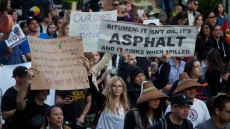ST. JOHN'S, N.L. - The leader of an organization representing Labrador Inuit is challenging the legal community to speed up the process in which aboriginal land claims wind through the courts so that generations aren't left waiting for answers.
Todd Russell, president of the NunatuKavut Community Council, made the comments Friday during a roundtable discussion on aboriginal engagement on natural resources at a meeting of the Canadian Bar Association in St. John's, N.L.
Russell told the group that the Supreme Court of Canada's recent decision granting aboriginal title — for the first time in Canadian history — to the Tsilhqot'in Nation in the B.C. Interior is promising for his 6,000-member group.
But Russell said he is dismayed by the amount of time it took to resolve the decades-old legal battle, which involved a trial in B.C. Supreme Court that began in November 2002 and lasted nearly five years.
"There's something not right about that," he said.
The dispute began in 1983 over the issuing of a commercial logging licence. In June, the high court issued a decision recognizing the Tsilhqot'in Nation's right to aboriginal title over 1,750 square kilometres of territory, which represents only a small portion of what the group considers its territory.
The court's unanimous ruling amounts to ownership akin to private property and provides a road map for First Nations across the country to establish title over unceded lands.
Russell said the lengthy process of taking land claims to court is discouraging for aboriginals who are fighting to protect their traditional hunting and fishing areas.
"I would challenge all you lawyers and judges and those who can influence the system that there's got to be ways to improve this system," he said.
"It's such a daunting place for us to be as aboriginals."
The NunatuKavut argue that transmission lines from the Muskrat Falls hydroelectric project in Labrador will cut across aboriginal lands, affecting hunting grounds and wildlife habitat.
Russell has said his people were never properly consulted and won't receive electricity from the project, and will continue to fight the development through the courts.
Robert Janes, a B.C.-based lawyer who focuses on aboriginal issues, said the reason land claim disputes trickle through the legal system is two-fold.
Firstly, many aboriginal bands don't have the finances to bring their cases to court in a timely fashion. Secondly, he said these types of cases involve a large amount of evidence covering the land's history and current use.
"It's just a massive amount of stuff to pull together and because of that you need long trials, and just to schedule long trials requires scheduling years in advance," he said in an interview after the roundtable discussion.
"All those things add up to make for very long, slow cases."
Janes said he wouldn't be surprised if more land claims are resolved outside of court post-Tsilhqot'in through consultation processes.





